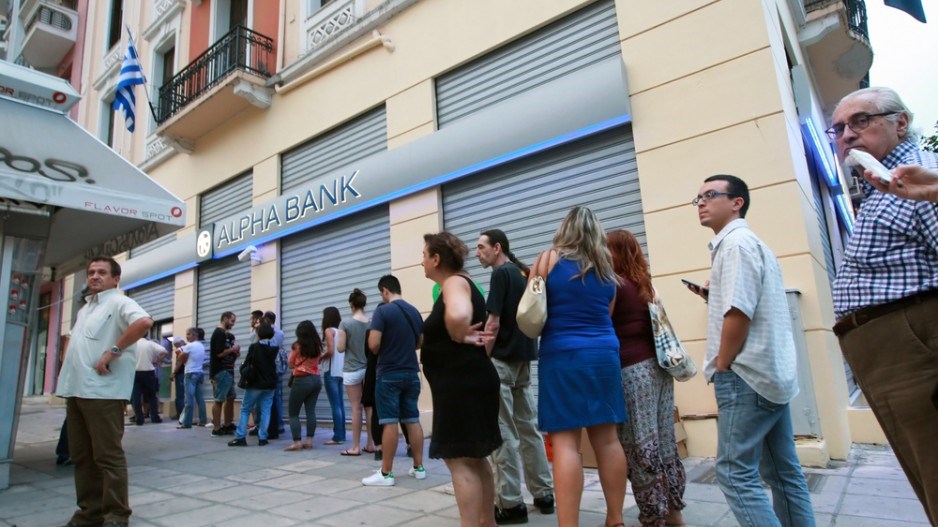The price of oil hit a three-week low June 29, falling below $62 per barrel, after Greece announced it was shutting its banks for six days and limiting withdrawals to €60 per day, per person.
Global markets also dipped, with the TSX decreasing 1.44%. The Canadian dollar has fallen half a cent to US$80.75.
The move by the Greek government to declare the week-long bank holiday was in response to the European Central Bank’s (ECB) announcement it would not increase emergency loans to the floundering country, which triggered fears of a withdrawal frenzy.
“Given the current circumstances, the Governing Council [of the ECB] decided to maintain the ceiling to the provision of emergency liquidity assistance (ELA) to Greek banks at the level decided on Friday, 26 June, 2015,” the ECB said in a June 28 statement.
“The Governing Council stands ready to reconsider its decision.”
The Greek government announced June 26 that a referendum will be held July 5 asking the Greek people if they will accept or reject bailout measures from their creditors, which include the International Monetary Fund (IMF), the European Union and the ECB. This vote will come days after Greece is expected to miss its next scheduled loan payment of €1.6 billion.
“Note that even if Greece does not pay on Tuesday [June 30], it in all likelihood will be in arrears, not default,” said CIBC economist Benjamin Tal. “That’s a huge difference at this point of the game and will buy some time while allowing the ECB to continue with the [ELA buffer].”
Tal said to this point, markets haven’t shown much reaction to the overall situation in Greece, but this is probably going to change.
“In all likelihood we will see North American bond markets rallying not only due to the Greek situation but also due to increased speculation that the situation is severe enough to impact the timing of the Fed’s move,” he said. “That in turn will work to limit the damage to the stock market.
“The euro in all likelihood will face renewed downward pressure vs. most majors. The net impact on the loonie should be negative due to safe heaven flight to the US dollar and the likely impact of uncertainty regarding the future of the zone on commodity prices.”
IMF managing director Christine Lagarde said, “The coming days will clearly be important. I welcome the statements of the Eurogroup and the European Central Bank to make full use of all available instruments to preserve the integrity and stability of the euro area. These statements underscore that the euro area today is in a strong position to respond to developments in a timely and effective manner, as needed.
“The IMF also will continue to carefully monitor developments in Greece and other countries in the vicinity and stands ready to provide assistance as needed.”
Tal said at this point, nobody can say for sure what will happen in the next few days.
“The situation is highly unpredictable,” he said. “Making bold predictions here is not productive.”




